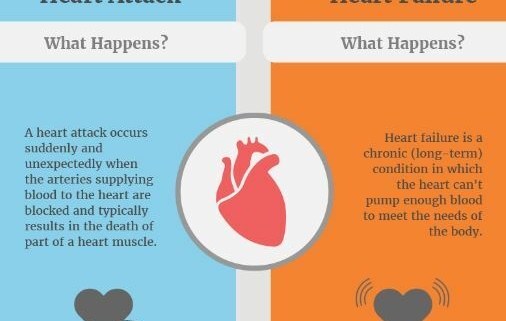Heart disease affects a large number of people in the world and in india. “Heart disease” typically refers to many different types of heart conditions that include heart failure and heart attacks. A person’s chances of developing heart disease increase more based on several risk factors such as whether or not you’re a smoker, if you have high blood pressure, or high cholesterol. Other risk factors like family history, your age which can’t be changed. If you’re looking for help with heart treatment in Dwarka, look no further than the best cardiologists and cardiology hospital in Dwarka, at the cardiology centre in Ayushman Hospital, Dwarka. This article will help you understand the difference between heart attack and heart failure.
While the both of them come under the category of heart disease, a heart failure isn’t the same as a heart attack. It’s vital to know the differences between these two in case you experience any form of cardiac event. Knowing the difference can help save your life and help your doctor make the right diagnosis and begin effective treatment at once.
Heart failure, also called congestive heart failure, and heart attack are different kinds of heart disease. Heart failure happens when the heart is too stiff or weak to pump blood properly to the rest of your body. This may happen because of high blood pressure or coronary artery disease; when the arteries that supply your heart with blood become narrower than normal.
A heart attack, which is also known as a myocardial infarction, occurs when blood flow to your heart is partially blocked or stopped completely. Blood keeps us alive by carrying oxygen to our heart, and anything that may end up blocking blood vessels; like plaque which is a buildup of fat or cholesterol, prevents this oxygen from reaching your heart. This partially damages or may completely destroy part of the heart muscle itself.
Heart Failure vs. Heart Attack Symptoms
Generally, the symptoms of heart failure reflect your heart’s inability to pump blood properly, so these symptoms may come and go, or they may persist over longer periods of time. In case you develop new symptoms, or if your existing symptoms worsen, it could spell your heart failure is getting worse or your current treatment isn’t working out as well as it before.
Heart failure symptoms include
coughing up white, pink, or foamy phlegm, unexpected fatigue or weakness, irregular heartbeat, nausea and loss of appetite, lack of breath when lying down or exerting energy,
there can also be some swelling of the abdomen or extremities caused because of fluid retention.
The symptoms of a heart attack can develop hours, days, or even weeks before the actual attack takes place. Some people will have no symptoms, while others may experience more serious symptoms almost immediately. The most common heart attack symptoms include chest pains, heavy pressure, tightness in the chest, or a squeezing sensation on the same. Breaking out into cold sweats, discomfort in the arms, back, neck, jaw, or stomach, followed by indigestion, nausea, and heartburn. Fatigue, Shortness of breath,
Sudden dizziness or light-headedness are other major symptoms.
So remember these differences, they could make the difference some day.






